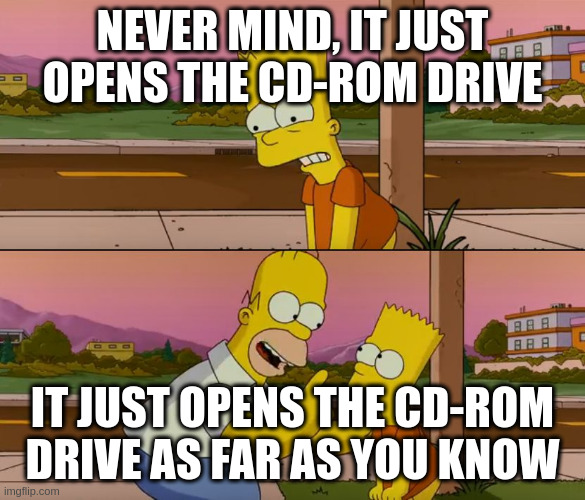Haha I remember the days of downloading random EXEs off the internet and running them to see what they do (also the days of CD-rom drives).
My auntie somehow managed to get a virus that played Für Elise through the motherboard speaker and never stopped so long as the thing was on. I don’t think they ever solved it, in the end they just got a new PC.
That probably wasn’t a virus.
Literally why would someone make that. That is completely indistinguishable as a signal.
I mean I guess you are supposed to take it to your computer repair shop and tell them it won’t stop playing Für Elise, and the shop is supposed to recognise it as a failure of CPU fan signal. If it just beeped a few times on startup then people would ignore it, and if it beeped constantly then well maybe Für Elise is nicer.
Huh yeah that’s MUCH better than throwing a post code and playing a beep during startup to signal something is wrong.
Sadly, many motherboards don’t have POST code displays.
Hm. Well if the motherboard can play a song it can blast “<Type> Error” during startup to be infinitely more helpful.
I don’t think those speakers are capable of voice. They can handle a few different beep tones and that’s about it. The song was not like listening to Spotify, it was played using beep tones.
I’m impressed that the computer was usable with the failed CPU fan.
Computers in 97 didn’t need much in the way of cooling. A large passive heatsink was plenty for those CPUs. They’re not the 300+ watt behemoths we have today.
I really remember heatsinks being a thing on overclocked systems around that time frame and then once we got to P4 cpus the chilling towers appeared those things were massive
The lower power 486s didn’t even need a heatsink. The P3 was the first to take a heasink resembling what we have today, but damn did the P4s need some serious cooling.
It’s kinda funny how we think the 100 watts of a desktop P4 was insane when now the TDP of a high end laptop CPU is more than that.
My Pentium 100 even says “Heatsink req’d”
It’s kinda funny how we think the 100 watts of a desktop P4 was insane when now the TDP of a high end laptop CPU is more than that.
It really isn’t. Modern mobile cpus barely sip power.
If you meant cell phones and tablets, that’s mostly due to the different architecture. RISC processors are super energy efficient, which also makes them much cooler to run.
x86-64 is a CISC architecture, which tends to be much more power hungry. There are only a couple of very low power Celeron CPUs that work under 10W of TDP, while that’s very common among phones’ CPUs.
Drain.exe would say “water in drive a:, commencing spin cycle” then power up the drive and make a gurgling sound.
Sheep.exe … would create a sheep that would wander the desktop.
Haha, in highschool I put sheep.exes into the school labs startup folders as a prank once. A couple days later the tech teacher approached me and was like “nobody’s in trouble but these things are a nightmare and if I have to reimage half the lab to get rid of them it would personally ruin my day”. Somehow all the sheep were gone by the next day
deleted by creator
Motherboards have speakers?
Back in my day, that used to be the only way a computer could produce sound. Later on you could purchase a specialized sound card that would take up a slot in your motherboard.
I thought I was the cool kid when I got my SoundBlaster 16!
Damn, I feel old now…
Are you trying to make me feel old?
I remember there was a virus that had a tiny cat on the screen and it would chase your mouse cursor. Once it catches your mouse cursor, the computer would crash. It was freaking awesome.
That’s based on a harmless Unix game that you can install forks of which on modern day Linux as well, by the way
i have a vencord extension that does that
What’s the name of the game?
The original was just neko. It probably hasn’t been maintained in forever though.
There is a webneko that you can embed on your website:
https://webneko.net/
Reminds me of Rensenware.
man i miss these days.
These days not only would it open your CD drive, it would open your tax documents, your crypto wallet, your account cookies, probably even your banking information.
The modern internet fucking sucks dude.
Put the rose tinted glasses to one side. We still had harmful viruses back in the day, difference is these days you are storing more private information “online” so the effect of compromise is larger.
i’m mostly just sad that the funny side of malicious software is gone.
There’s no more funny malware. It’s all ransomware and stealers.
There’s no more funny malware.
That depends who gets infected.
You or me infected by malware? No thanks!
Egon Mark infected by malware? Absolute hilarity!
Back then, there were still lots of “wipers” that deleted files and/or destroyed the OS. Now it’s all spyware and ransomware.
deleted by creator
The thing is, harmful apps are now difficult to detect compared to years ago. The hackers prefer to get the control of your device without ruining it.
There’s even extreme edgecases where a compromised machine being part of a botnet actually improves security because the malware shores up security to help itself remain persistent and not find itself removed/blocked by other malware or attackers
Oh don’t worry, malicious .exe files were all over the forums back then.

How could I know, out of curiosity? I probably have the exe from the time period.
Try decompiling it.
Great question! Not really my area of expertise, but probably there are at least a couple of possible avenues. One is decompilation and/or disassembly and static analysis. (Basically use automated tools to reconstruct the original source code as best it can and then read that imperfect reconstruction of the source code to figure out what it does.) Another is isolating it (“air gap” – no network or connectivity to anything you care about) so you’re sure it can’t do any damage and running it with tools that record/report everything it does. (On Linux, one could use
straceand/or GDB. On Mac,dtrace. Not sure what the equivalent is for Windows programs running on Windows.)Actually, I guess another option could be to set up an isolated system, record a whole bunch of information about it before running the .exe then after running the .exe, examine it to see what you can find on the filesystem or in the registry or in RAM or whatever that might have changed. It wouldn’t catch everything, though. Like if it made a network connection or something but didn’t actually change anything on the filesystem, it might not leave any traces.
Whatever the case, it’d probably require some specialized tools and expertise. But it’d be an interesting project.
I remember a guy who tied his baby’s rocker to the drive and wrote code to open and close the CD drive repeatedly lol. Fun times.
Hmm. Did the motor last? It’s obviously not built to provide that much torque/force, although I can’t say for sure it would be damaged by it.
I have a folder of “pranks” like these from way back and they were harmless but sure enough they fire off modern anti virus software.













